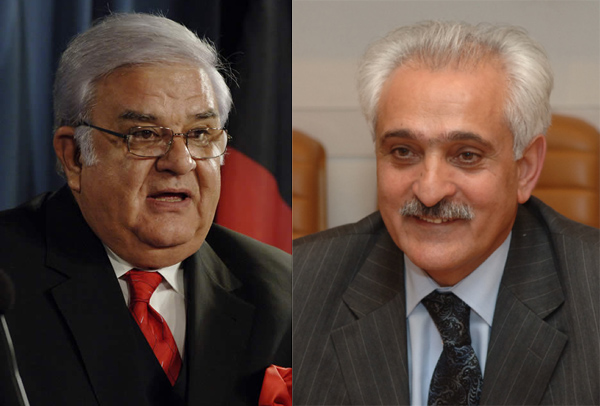Afghan Officials Want War Goals Maintained
Two key Afghan officials, in Washington for discussions with the Obama administration about the future of the Afghanistan war, urged the U.S. against scaling back its ambitions in Afghanistan.
Jul 31, 202013.8K Shares1M Views

Afghan Defense Minister Abdul Rahim Wardak and Foreign Minister Rangin Dadfar Spanta (Afghan Embassy, NATO)
Two key Afghan officials, in Washington for discussions with the Obama administration about the future of the Afghanistan war, urged the U.S. against scaling back its ambitions in Afghanistan.
Speaking at gatherings convened by two think tanks close to the administration, Defense Minister Abdul Rahim Wardak and Foreign Minister Rangin Dadfar Spanta warned against reducing support for what Wardak called “a strong central government.” The Obama administration is currently reviewing policy options for the seven-year long war, and several administration officials have urged refocusing U.S. efforts on core interests like eradicating safe havens for Al Qaeda and the Taliban, rather than** creating**what Defense Secretary Bob Gates has derisively calleda “Central Asian Valhalla.” The Obama administration has expressed impatience with Afghanistan President Hamid Karzai over governmental corruption; and Karzai recently likenedrelations with the new administration to a “gentle wrestling match.”
Illustration by: Matt Mahurin
Both men met yesterday at the White House with senior administration officials, including ret. Marine Gen. Jim Jones, President Obama’s national security advisor, and the leaders of the administration’s ongoing Afghanistan-Pakistan strategy review, former CIA official Bruce Riedel, Undersecretary of Defense Michele Flournoy and Amb. Richard Holbrooke.** **The review is designed to shape the future of U.S. policy toward the two countries wracked by Al Qaeda-supported insurgencies. Delegations from Afghanistan and Pakistan are in town this weekto lend their input to the review.
Spanta told an audience at the Center for American Progress Thursday morning** that he implored the review**to emphasize support for Afghan “security, sustainable development, and good governance.” A “reductionist” approach that focused just on counterterrorism operations “is bound to fail,” he said. He indicated that the Obama strategy review focused many of its questions on security issues in Afghanistan. “I would link what we discussed with our American colleagues with the need for a Democratic Afghanistan,” Spanta said.
Wardak gave a feisty and somewhat combative address at a panel sponsored by the Center for a New American Security on Thursday, the think tank that Flournoy co-founded in 2007. He accused the media of painting a “gloomy picture” of Afghanistan and ignoring “the improvement across all sectors of government.” (A reportreleased today from the centrist Center for Strategic and International Studies warned that the people of Afghanistan “experience deteriorating security and a worsening economic situation.”) Reiterating his desire for a “long-term partnership” with the United States, Wardak said his primary strategy for security in Afghanistan would be the accelerated development of the Afghan National Army from nearly 86,000 soldiers currently to 134,000 by 2013, and to gradually phase the the army into “lead[ing] the fight independently” of U.S. and NATO troops. He did not give timetables for the transition.
Saying that 2009 would be “critical,” Wardak predicted that “this year, the Afghan National Army’s performance will exceed your expectations, as more operations will be led by the [army] and it will take more responsibility for more provinces.”
Wardak mirrored Spanta’s comments about abandoning broader aims in Afghanistan, but added a darker undercurrent. “Changing course, embracing a strategy of containment or abandoning the approach of a strong central government” would amount to “falling into the trap the enemy has laid,” he said.
Similarly, Spanta backed Wardak in urging Americans to support funding for the development of the Afghan security forces. Putting Afghans in the lead for security missions is “the precondition [for] acceptable security in Afghanistan,” an approach endorsed by Defense Secretary Gates and Gen. David McKiernan, the U.S. commander in Afghanistan, who recently signed an accord with Wardak to better integrate Afghan Defense Ministry planning in the design of U.S. operations.
In one case, Spanta went further than Wardak in publicly calling for reconciliation with insurgents not tied to Al Qaeda. “We have the responsibilty to support and help them come back to Afghan society,” he said, claiming that “there is no difference between us and our allies,”** **a remark seeming to indicate that the Obama review team agrees on the need for widespread insurgent reconciliation. Asked by The Washington Independent what percentage of the insurgency was reconcilable, Spanta that the “It’s hard to give a percentage but we know it is a remarkable [proportion], if some entities in our neighborhood allow it,” seeming to suggest that Pakistan, where senior Taliban leadership is believed to operate, is hindering reconciliation efforts.
While the Obama administration may** **narrow its strategic goals for the Afghanistan war — Obama has said that eradicating safe havens for Al Qaeda and the Taliban leadership in Afghanistan and Pakistan would amount to success — a host of recent reports from administration allies have said that the sort of robust support for Afghan development and governance efforts that Spanta advocated are the only way to achieve such counterterrorism objectives. The progressive National Security Network made the case last weekthat such care for the needs of Afghan civilians would be necessary to cleave the population from the Taliban and its Al Qaeda allies, as did a paper last month from the Center for a New American Securitythat was co-written by Vikram Singh, now an adviser on Afghanistan and Pakistan to Undersecretary Flournoy.
Indeed, at the Center for American Progress — run by John Podesta, who chaired the Obama team’s transition into office — Spanta made an ideological case for continued U.S. commitment aimed at the ascendant progressive community. “We require and urge all like-minded progressive and democratic voices” to give “support and solidarity to democracy in Afghanistan,” he said.

Hajra Shannon
Reviewer
Latest Articles
Popular Articles
